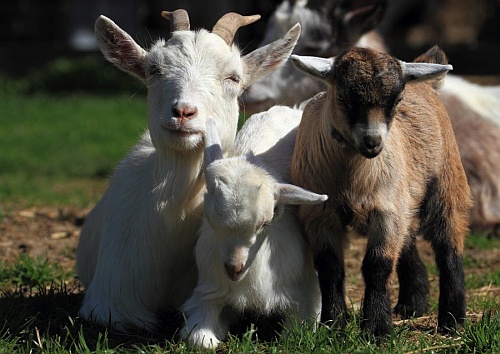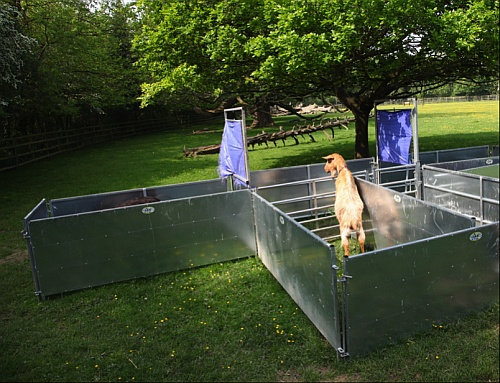In today’s ‘Interview with an Author’, we spoke to Dr. Alan McElligott, one of the corresponding authors of the recent PeerJ article “Goats favour personal over social information in an experimental foraging task” published last month, and so we were very interested in hearing about his experiences with us.

Alan McElligott is originally from Ireland. He gained a Zoology degree from University College Cork followed by a PhD at University College Dublin. His PhD work focused on life history, sexual selection and vocal communication of fallow deer. More recently, his research has focused on vocal communication and cognition in domestic livestock species. He has worked at the University of Zurich and University of Nottingham before joining Queen Mary, University of London in 2008. He is currently a Senior Lecturer in animal behavior and based in the Biological and Experimental Psychology division of the School of Biological and Chemical Sciences.
PJ: Dr. McElligott, can you tell us a bit about yourself?
AME: I am based at Queen Mary, University of London. One of the main research themes of my group is aimed at developing a greater understanding of social behaviour, cognition and communication in domestic goats. This paper resulted from work with Luigi Baciadonna and Dr. Elodie Briefer.
PJ: Can you tell us about goat behaviour and the research you published with us?
AME: Our former research on goats provided evidence that goats have good cognitive abilities. For instance, mother and kids recognize each other vocally, from at least 5 days postpartum (Briefer & McElligott 2011), and mothers have remarkable long-term memory of their kids’ calls (up to 13 months after separation; Briefer et al. 2012).

Photo Credit: Brian Squibb
We also discovered that goat kids develop group-characteristic vocalisations through vocal learning (Briefer & McElligott 2012); an ability previously unknown in ungulates, and rare in mammals in general. Intelligent species are commonly assumed to use social learning (i.e. to copy the behaviour of others). In our paper published in PeerJ, we therefore decided to test social learning in goats. Goats were tested in a T-maze containing buckets with or without food on the right and on the left. They observed a goat going to one particular side and eat from a bucket (“demonstrator”), and we then tested whether they would go to the same side (“copy”) or to the opposite side. In the first condition, they did not know if the food was on the right or on the left (i.e. no personal information about food location). In the second condition, they had been trained individually to go to one side, which corresponded to the opposite side as their demonstrator (i.e. conflicting personal and social information). Each of them was tested with one more socially dominant and one less dominant demonstrator.

Photo Credit: Dr. Elodie Briefer
Our results show that, when goats have no information about food location, they go randomly to the right or left of the T-maze, without particularly copying the demonstrator. Furthermore, when they have been trained to go on one side, they choose this side in most cases and not the side shown by the demonstrator, regardless of its dominance rank. These results suggest that goats do not learn by observation and rely more on their personal knowledge than on social information. These findings also agree with the common public perception that goats are quite “independent”, as well as generally highly curious.
PJ: What’s next in your research?
AME: We currently have several other projects examining goat behaviour and cognition. For example, we are studying the influence of emotions on their vocalisations. We are also examining how good goats are at learning and remembering novel physical cognition tasks.
PJ: And why did you choose to submit this research to PeerJ?
AME: PeerJ looks like an exciting new online journal and I like the ethos behind it. Of course, not forgetting the fact that there was a special free publishing offer for manuscripts submitted during July 2013.
PJ: What was your experience of the PeerJ submission process?
AME: Excellent. Fast, efficient and thorough. We got some useful comments from the referees that helped improved the clarity of the paper.
PJ: And the review process?
AME: Very good and fair.
PJ: What do you think to the overall speed of the process?
AME: Great! We submitted at the end of July and the paper was online in September.
PJ: What do you think about our “Pay once, Publish for life” Membership?
AME: Excellent idea. Open access publishing is usually prohibitively expensive.
PJ: Would you submit again, and would you recommend that your colleagues submit to PeerJ?
AME: Yes and yes.
PJ: In conclusion, how would you describe PeerJ in three words?
AME: Welcome publishing innovation.
PJ: Many thanks for your time!
If you would like to experience our publishing innovations for yourself then submit your next article to us.

